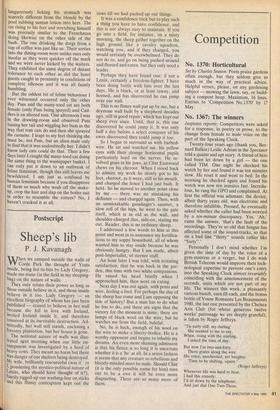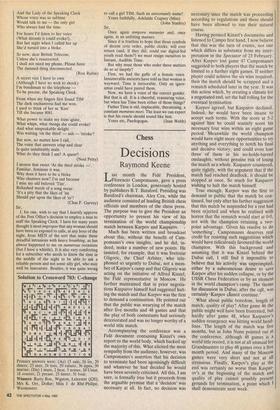No. 1367: The winners
Jaspistos reports: Competitors were asked for a response, in poetry or prose, to the change from female to male voice on the part of the Speaking Clock.
Twenty-four years ago (thank you, Ber- nard Balkin) Leslie Adrian in the Spectator told a quaint and apt story. A friend of hers had been let down by a girl — the one called TIM. One night he checked his watch by her and found it was ten minutes slow. He reset it and went to bed. In the morning he checked again and found his watch was now ten minutes fast. Incredu- lous, he rang the GPO and complained. At first the official was adamant: the device, albeit thirty years old, was electronic and therefore infallible. Pressed, he eventually asked whether the caller had been worried by a ten-minute discrepancy. Yes. `Ah,' came the answer, 'that's the fault of the recordings. They're so old that fungus has affected some of the sound-tracks, so that on a bad line "thirty" sounds rather like "forty": Personally I don't mind whether I'm given the time of day by the voice of a gym-mistress or a verger, but I do wish British Telecom would improve their tech- nological expertise to prevent one's entry into the Speaking Clock almost invariably coinciding with the announcement of the seconds, units which are not part of my
life. The winners this week, a pleasantly various bunch, earn £8 each, and the bonus bottle of Vosne Romanee Les Beauxmonts 1980, the last one presented by the Chelsea Arts Club (for whose generous twelve weeks' patronage we are deeply grateful), is taicen by Roger Jeffreys.
"Tis early still, my darling' She seemed to me to say, When, rising with the starling, I asked the time of day.
But now I'm two-and-forty There grates along the wire His voice, unschooled, yet haughty: 'Time to be shifting, squire.' (Roger Jeffreys) Whenever life was hard to bear, I had this remedy: I'd sit down by the telephone, And just dial One-Two-Three, And the Lady of the Speaking Clock Whose voice was so sublime Would talk to me — the only girl Who always had the time.
For hours I'd listen to her voice (What dreams it could evoke!), But last night when I called her up She'd turned into a bloke.
So now, dear British Telecom, Unless she's resurrected, I shall not need my phone. Please have The damned thing disconnected. (Ron Rubin) A secret vice I have to own (Although I have no wish to shock): I'm bondsman to the telephone — To be precise, the Speaking Clock.
From when my fingers first found TIM The dark enchantress had me won. I used to think of her as 'Kim' Till she became 8081.
What power to make my loins ignite, What whips, what thongs she could evoke! And what unspeakable delight Was waiting 'on the third' — aah — 'stroke!
But now, no matter how I rail, The voice that answers crisp and clear Is quite indubitably male.
What do they think I am? A queer?
(Noel Petty) I mourn that sweet 'At the third stroke —'. Familiar, feminine it was.
Why does it have to be a bloke Who chunters now? I'm sad because I miss my old beloved 'Tim'.
Rehashed words of a song occur: 'It's a pity that the likes of 'im Should put upon the likes of 'er'!
(Chas F. Garvey) Sir, I, for one, wish to say that I heartily approve of the Post Office's decision to employ a man to staff the Speaking Clock. I have for many years thought it most improper that any woman should have been so exposed to calls, at any hour of the night, from MEN of the sort that make these dreadful intrusions with heavy breathing, as has almost happened to me on numerous occasions (but I have a whistle). It is also very comforting for a subscriber who needs to know the time in the middle of the night to be able to ask a reliable person and not some silly girl, who may well be inaccurate. Besides, it was quite wrong to call a girl TIM. Such an unwomanly name!
Yours faithfully, Adelaide Crapsey (Miss) (John Stanley) Sir, Once again tempora mutantur and, once again, in an unfitting manner.
Since it is fruitless to hope that those symbols of decent civic order, public clocks, will ever return (and, if they did, could our digital-fed youth read them?) we must resign ourselves to Instant, Audible Time.
But why must those who order these matters do so sd ineptly?
First, we had the gaffe of a female voice. Innumerable ancients have told us that woman is wayward. Time is inexorable. Only an ignor- amus could have paired them.
Now, we have a voice of the correct gender. But that is all. It is a cheerful, reassuring voice, but when has Time been either of those things?
Father Time is old, implacable, threatening, a constant memento mori. The least we can expect is that his oracle should sound like him.
Yours etc, Paedogogus. (Jane Webb)



















































 Previous page
Previous page